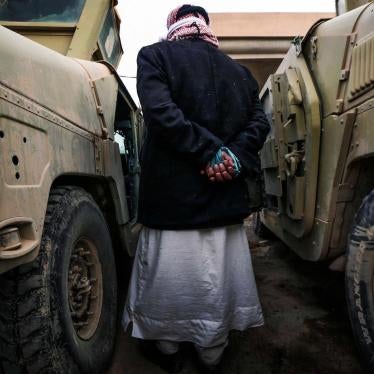(New York) - Obama administration-backed legislation before the US Senate to revise military commissions would harm efforts to bring terrorism suspects to justice, Human Rights Watch said today. The changes to existing military commissions legislation were included in the defense authorization bill that was approved by the Senate Armed Services Committee last week and is expected to be voted on by the full Senate next week.
"The discredited military commissions should have been abandoned long ago," said Joanne Mariner, Terrorism and Counterterrorism Program director at Human Rights Watch. "The Obama administration is repeating a Bush-era mistake at the expense of real justice for crimes against the United States."
Section 1031 of the National Defense Authorization Act for fiscal year 2010 would establish procedures governing the use of military commissions to try alien "unprivileged enemy belligerents" (individuals previously labeled "unlawful enemy combatants") for violations of the laws of war and other offenses. The measure addresses some of the due process concerns raised by the Military Commissions Act of 2006. It would, for example, make it harder to admit evidence before the commissions derived from some - though not all - forms of coercion.
The very purpose of the military commissions is to permit trials that lack the full due-process protections available to defendants in federal courts, Human Rights Watch said. Tinkering with the procedures of tribunals created from scratch forfeits the benefits of using long-established civilian criminal courts whose procedures and protections have been tried and tested through many years of litigation. Prosecuting civilians who may not have been involved in an armed conflict before military tribunals is inconsistent with fair-trial standards. And cases are likely to become bogged down in years of litigation.
As the latest version of the military commissions created by the Bush administration, the revised tribunals would be viewed globally as unfair, harming chances of international cooperation. The previous commissions were highly susceptible to improper political influence, which caused several military commission prosecutors to resign in protest. Trying only people who are not US citizens before the commissions raises further concerns about fairness.
As a presidential candidate, Barack Obama rightly called the military commissions at Guantanamo Bay "an enormous failure." On his second day in office, he suspended the commissions for 120 days and announced plans to close the detention center at Guantanamo within a year.
Terrorism suspects should be prosecuted in federal civilian courts, which can try conspiracy and material support for terrorism, charges not considered war crimes, Human Rights Watch said. The federal courts have shown themselves to be fully capable of trying terrorism cases while protecting intelligence sources and the due-process rights of the accused. In the more than seven years since the military commissions were announced, only three suspects have been prosecuted, while the federal courts have tried more than 145 terrorism cases during the same period. Those suspects for whom there is an insufficient basis to bring charges should not be tried in substandard commissions, but released from detention to their home countries or elsewhere.
"Anyone responsible for terrorist activity against the US should be tried in regular federal courts," said Mariner. "Unlike the compromised military commissions, the federal courts have a long history of successfully prosecuting terrorism cases."






